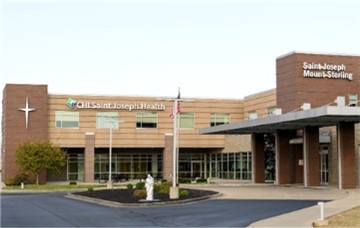MOUNT STERLING, KY ─ As the temperatures drop and winter weather approaches, CHI Saint Joseph Health urges community members to be proactive in knowing the potentially adverse effects winter can have on their heart health.
“Regardless of background, age or gender, it is important to be aware of the cold and how it could impact your heart health,” said Sharat Koul, DO, FACC, FSCAL, an interventional cardiologist with CHI Saint Joseph Medical Group. “Cold temperatures put extra stress on your heart by pushing your blood pressure up, which can precipitate a range of cardiovascular events.”
When your body is experiencing extreme cold temperatures, it can add a burden to your cardiovascular system. The cold causes your heart to work overtime to keep you warm and constricts your arteries, limiting the blood flow to your heart. This heightened workload can elevate heart rate and blood pressure, potentially leading to a heart attack or stroke.
While maintaining regular physical activity is critical for heart health, exercise caution when engaging in outdoor activities during the winter. Whether you’re shoveling snow in the driveway or running through the neighborhood, be mindful that physical exertion in colder temperatures can cause additional strain on your heart. Particularly with activities like snow removal, it is important to steer clear of overexertion and refrain from pushing yourself beyond your limits. Snow removal is a very strenuous activity, and your heart is already working overtime to combat the cold.
People with heart conditions such as arrhythmia or high blood pressure, or those with risk factors such as being overweight, smoking or having diabetes, should be particularly vigilant during winter as they are at a greater risk of heart issues during colder temperatures.
To protect your heart during the winter months, CHI Saint Joseph Health providers advise dressing in layers when venturing outdoors, limiting exposure to the cold weather, staying informed of the extreme temperature forecasts, and remaining dry during freezing rain and snow. Additionally, keep up with your heart health year-round by staying hydrated, eating a balanced diet, getting plenty of sleep, and exercising at least 150 minutes weekly. These proactive measures can collectively help safeguard your heart during winter months.
Recognizing the warning signs of a heart attack is also crucial for timely intervention. Symptoms include chest pain or discomfort; pain in the jaw, neck or back; shortness of breath; dizziness; and nausea or vomiting. Women may also experience upper abdomen pain, indigestion and faintness. If you suspect someone is having a heart attack, dial 911 immediately and, if able to, administer hands-only CPR. If you are not already CPR-certified, acquire the necessary skills at https://cpr.heart.org/en/.
Identifying a stroke is equally critical, and the acronym F.A.S.T. helps simplify the process (F – face drooping, A – arm weakness, S – speech difficulty, and T – time to call 911). Every minute counts when someone is experiencing a stroke, so it is paramount to act fast.
To learn more about CHI Saint Joseph Health’s heart care, visit chisaintjosephhealth.org/heart-vascular-care/heart-care.
 About CHI Saint Joseph HealthCHI Saint Joseph Health, part of CommonSpirit Health, is one of the largest and most comprehensive health systems in the Commonwealth of Kentucky with 100 locations in 20 counties, including hospitals, physician groups, clinics, primary care centers, specialty institutes, home health agencies and an ambulatory Care Center. The hospitals in CHI Saint Joseph Health are Flaget Memorial Hospital, Saint Joseph Berea, Saint Joseph East, Saint Joseph Hospital, Saint Joseph Jessamine, Saint Joseph London, Saint Joseph Mount Sterling, and Women’s Hospital at Saint Joseph East. In total, the health system serves patients in 35 counties statewide. CHI Saint Joseph Health is dedicated to providing a wide array of services toward a goal of building a healthier future for all. CHI Saint Joseph Health embodies a strong mission and faith-based heritage and works through local partnerships to expand access to care in the communities it serves.
About CHI Saint Joseph HealthCHI Saint Joseph Health, part of CommonSpirit Health, is one of the largest and most comprehensive health systems in the Commonwealth of Kentucky with 100 locations in 20 counties, including hospitals, physician groups, clinics, primary care centers, specialty institutes, home health agencies and an ambulatory Care Center. The hospitals in CHI Saint Joseph Health are Flaget Memorial Hospital, Saint Joseph Berea, Saint Joseph East, Saint Joseph Hospital, Saint Joseph Jessamine, Saint Joseph London, Saint Joseph Mount Sterling, and Women’s Hospital at Saint Joseph East. In total, the health system serves patients in 35 counties statewide. CHI Saint Joseph Health is dedicated to providing a wide array of services toward a goal of building a healthier future for all. CHI Saint Joseph Health embodies a strong mission and faith-based heritage and works through local partnerships to expand access to care in the communities it serves.
###










